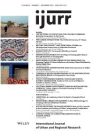Since the Islamic revolution of 1979, several urban land laws and regulations, as well as a new urban land development policy, have been initiated in Iran. The implementation of these policies was mainly based on public land ownership as a fundamental principle. This paper evaluates the process of recent urban land development policy and focuses on the effectiveness of the policy in terms of land supply. It includes a discussion on the issue of public land ownership, an investigation of post‐revolutionary urban land policies in Iran, a discussion on the evaluation of urban land development policy in terms of land supply, and finally, presents an argument on the relationship between public land ownership and urban development. The paper argues that alongside the primary advantages of public land ownership, such as urban growth control, preventing land speculation and providing land for various social needs, the land policy has succeeded to some extent in meeting residential land demand in the study period. However, in terms of the effectiveness of the land supply policies, the paper raises some concerns such as the centralized nature of the land development process, land wastage and isolation from the general process of planning.
Details
Written by:
Mohammad Mehdi Azizi
Digital Object Identifier (DOI)
10.1111/1468-2427.00125
About DOI
Read full article as PDF
Read full article as HTML
See the references for this article
